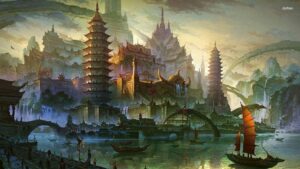Chinese History Timeline
| Period | Key Events |
|---|---|
| Xia Dynasty (2100–1600 B.C.) | Legendary rulers, including Emperor Yu, lay the foundation for early Chinese civilization. |
| Shang Dynasty (1600–1050 B.C.) | Tribal chief Tan establishes the first recorded ruling dynasty in China, marked by advancements in astronomy and mathematics. |
| Confucius (551–479 B.C.) | The philosopher Confucius shapes Chinese culture with his teachings on morality and governance. |
| Qin Dynasty (221–206 B.C.) | Emperor Ying Zheng unifies China, standardizes script, constructs the Great Wall, and commissions the Terracotta Army. |
| Silk Road (125 B.C.) | Zhang Qian’s exploration opens the Silk Road, facilitating trade and cultural exchange between East and West. |
| Paper and Books (105 A.D.) | Cai Lun invents paper, revolutionizing communication and enabling the mass production of books and literature. |
| Gunpowder (850 A.D.) | Alchemists discover gunpowder, leading to its use in warfare and the invention of fireworks. |
| Printing Press (868 A.D.) | The printing press is invented, allowing for the mass production of texts and accelerating literacy rates. |
| Kublai Khan (1260 A.D.) | Kublai Khan establishes the Yuan Dynasty, uniting China and expanding its influence across Asia and Europe. |
| Ming Dynasty (1557) | Maritime trade flourishes, bringing prosperity and cultural exchange between China and the world. |
| Opium Wars (1840–1864) | China’s conflicts with Western powers over opium trade and sovereignty lead to significant political and social upheaval. |
| Republic of China (1912) | Sun Yat-sen leads the Xinhai Revolution, ending millennia of imperial rule and establishing the Republic of China. |
| Communist Party of China (1921) | The CPC is founded, eventually leading to the establishment of the People’s Republic of China under Mao Zedong’s leadership. |
| Tiananmen Square Protests (1989) | Student-led protests demanding political reform are violently suppressed, shaping modern Chinese politics and society. |
| Three Gorges Project (1993) | Construction begins on the world’s largest hydroelectric dam, sparking controversy over environmental and social impacts. |
| Hong Kong Returns to China (1997) | After 156 years of British rule, Hong Kong is handed back to Chinese sovereignty under the “one country, two systems” framework. |
| Modern Era (2000s–present) | China emerges as a global economic powerhouse, undergoing rapid modernization and asserting its influence on the world stage. |
Ancient Roots: Tracing China’s Rich Cultural Tapestry

The origins of Chinese civilization are veiled in antiquity, with legends suggesting the Xia Dynasty, led by Emperor Yu, as the earliest rulers around 2100 to 1600 B.C. However, concrete evidence validating this claim is scant. Let’s embark on a journey through the annals of one of humanity’s oldest cradles of civilization.
Shang Dynasty and the Influence of Confucius:
- 1600-1050 B.C.: The Shang Dynasty emerges as the inaugural recorded ruling dynasty of China, helmed by tribal chief Tan. This era witnesses notable strides in astronomy and mathematics.
- 551–479 B.C.: Confucius, the esteemed teacher, philosopher, and statesman, rises from humble beginnings. Despite facing political exile, his teachings, like “Wherever you go, go with all your heart” and “It does not matter how slowly you go as long as you do not stop,” resonate through Chinese culture, shaping societal values.
The Legacy of the Qin Dynasty:
- 221-206 B.C.: The Qin Dynasty, heralding the inception of China’s first official empire, leaves an indelible mark. Under Emperor Ying Zheng’s reign, monumental projects like the 500-mile Straight Road and the iconic Terracotta Army signify the dynasty’s prowess.
Milestones Along the Silk Road:
- 125 B.C.: Zhang Qian’s arduous expedition catalyzes the birth of the Silk Road, revolutionizing international trade.
- 105 A.D.: Cai Lun’s ingenious invention of paper fosters a literary revolution, enabling the dissemination of knowledge through dictionaries and historical texts.
- 850 A.D.: The accidental discovery of gunpowder paves the way for transformative developments in warfare and entertainment.
- 868 A.D.: The advent of the printing press revolutionizes communication, heralding an era of mass literacy.
Era of Expansion and Turmoil:
- 1260 A.D.: Kublai Khan’s imperial ambitions reshape the geopolitical landscape, fostering cultural exchange and economic prosperity.
- 1557: The Ming Dynasty’s maritime prowess fosters global trade and cultural exchange.
- 1840-1864: The Opium Wars and the Taiping Rebellion underscore China’s tumultuous encounters with Western imperialism and internal strife.
Modern Transformations:
- 1912: The establishment of the Republic of China marks a pivotal juncture in Chinese history, propelled by the Xinhai Revolution.
- 1921: The Communist Party of China emerges as a formidable political force, catalyzing seismic shifts in governance and society.
- 1972: Richard Nixon’s historic visit to China initiates a new era of diplomatic engagement and economic cooperation.
- 1997: The return of Hong Kong to Chinese sovereignty symbolizes the culmination of a tumultuous colonial legacy.
As we traverse China’s intricate tapestry of history, it becomes evident that its journey is characterized by resilience, innovation, and profound societal transformations.